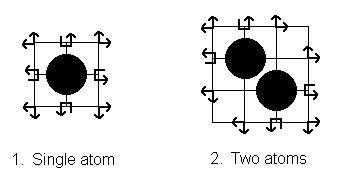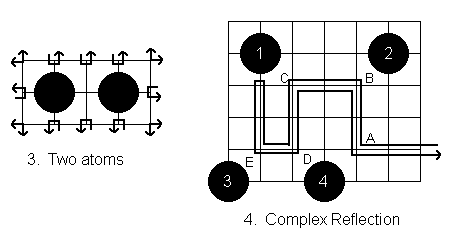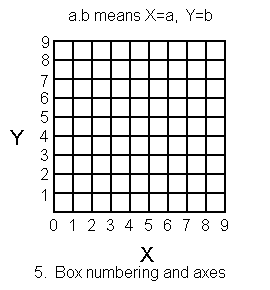This program is Copyright © HP and is used here by permission. It was originally printed in the Games Solution Book. This program was entered and uploaded by Tony Duell. The documentation was entered by Dave Hicks. The Barcode for this program was provided by Brian Ward.
This program is supplied without representation or warranty of any kind. Tony Duell, Hewlett Packard and The Museum of HP Calculators therefore assume no responsibility and shall have no liability, consequential or otherwise, of any kind arising from the use of this program material or any part thereof.
N atoms are randomly placed in a black box with dimensions l0x10. No atom can be on the edge of the box. By firing particles into the box from the edges, and noting their exit locations, you attempt to find the atom positions. For a single atom, the scatters and reflections are as shown in Figure 1. Multiple atom scatters are simple extensions of this diagram: See, for examples, Figures 2 and 3. Note in particular, the back reflections of Figure 3 which arise from two combined scatters. More complex scattering and reflection are shown in Figure 4 where atom 4 causes scatter A, atom 2 causes B, 1 causes C, 4 (again) causes D, 3 causes E, and atom 1 reflects the particle back along the convoluted path. The numbering of the box grid is given in Figure 5. The 5th position on the base has coordinates 5.0, the 7th on the right is 9.7, and so on.
You select the value of N, and the machine places the N atoms randomly. You then fire particles from the edge: The machine tracks them and displays the output edge locations. At any time you can get the machine to confirm or reject any suspected atom location. If the guess is wrong, you are "penalized" by having the number of used particles increased by 5. The object of the game is not only to find the atoms, but to do so with the minimum number of probes.
NOTE: Although 9 atoms may be placed, a "good" game is 4 or 5.
Diagrams



Note: Requires 1 Memory Module on HP-41C
Step |
Instructions |
Input Data/Units |
Keys |
Output Data/Units |
1 |
Enter program |
|||
2 |
Initialize |
|
[XEQ] SCATTER |
SEED? |
3 |
Key in number between 0 and 1 | seed |
[R/S] |
NO. OF ATOMS? |
4 |
Key in number of atoms to be placed. |
N |
[R/S] |
READY |
5 |
Key in an entrance point. |
x.y |
[R/S] |
(x).(y) |
6 |
To guess a position key one in. | x.y |
[A] |
YES (or) NO |
( ) PROBES |
||||
| Continue with steps 5 and 6 as desired. | ||||
7 |
To start a new game go to step 4. |
|
[E] |
NO. OF ATOMS? |
8 |
If at any time you give up you can find all positions. |
[C] |
(x).(y) . . . |
Set up and find 4 atoms
Keystrokes: Display:
[XEQ] [ALPHA]
SIZE [ALPHA] 022
[XEQ] [ALPHA]
SCATTER [ALPHA] SEED?
.191062 [R/S] NO. OF ATOMS?
4 [R/S] READY
2.0 [R/S] 0,2
4.0 [R/S] 9,2
3.3 [A] YES
2 PROBES
6.9 [R/S] 6,9
6.8 [A] NO
8 PROBES
0.8 [R/S] 9,8
. .
. .
How to get this Program to your Calculator (via
HP-IL, disk, wand, and fingers)
Download Binary (.raw) program for disk or PC HP-IL
Card download
Download Hexadecimal (.dat) program for Serial
Port download
Display the Program Barcode (.pdf) for printing and scanning
LINE KEYS 01 LBL "SCATTER" 02 SF 27 03 CF 29 04 SF 28 05 FIX 00 06 "SEED?" 07 PROMPT 08 STO 00 09 LBL E 10 0 11 STO 11 12 "NO. OF ATOMS?" 13 PROMPT 14 STO 10 15 1 E3 16 / 17 1 18 + 19 STO 12 20 LBL 00 21 XEQ 10 22 XEQ 10 23 10 24 / 25 + 26 RCL 12 27 INT 28 X<>Y 29 STO 09 30 LBL 01 31 RCL IND Y 32 X=Y? 33 GTO 00 34 RDN 35 LBL 09 36 DSE Y 37 GTO 01 38 STO IND 12 39 ISG 12 40 GTO 00 41 "READY" 42 AVIEW 43 GTO 20 44 LBL 10 45 RCL 00 46 9821 47 * 48 .211327 49 + 50 FRC 51 STO 00 52 8 53 * 54 1 55 + 56 INT 57 RTN 58 LBL 20 59 STOP 60 INT 61 STO 12 62 STO 15 63 CF 00 64 X=0? 65 SF 00 66 9 67 X=Y? 68 SF 00 69 CF 01 70 X=Y? 71 SF 01 72 LASTX 73 FRC 74 10 75 * 76 STO 13 77 STO 14 78 X=Y? 79 SF 01 80 1 81 ST+ 11 82 LBL 02 83 RCL 10 84 STO 21 85 10 86 STO 17 87 LBL 05 88 RCL IND 21 89 INT 90 LASTX 91 FRC 92 10 93 * 94 RCL 13 95 - 96 X<>Y 97 RCL 12 98 - 99 FS? 00 100 X<>Y 101 STO 20 102 ABS 103 1 104 - 105 X>0? 106 GTO 09 107 RDN 108 STO 16 109 FS? 01 110 CHS 111 X<0? 112 GTO 09 113 RCL 17 114 X<>Y 115 X>Y? 116 GTO 09 117 SF 03 118 X#Y? 119 CF 03 120 STO 17 121 RCL 20 122 STO 18 123 RCL 16 124 STO 19 125 SF 02 126 LBL 09 127 DSE 21 128 GTO 05 129 FS?C 02 130 GTO 09 131 0 132 ENTER 133 9 134 FS? 01 135 X<>Y 136 RCL 12 137 RCL 13 138 FS? 00 139 X<>Y 140 RDN 141 FS? 00 142 X<>Y 143 STO 15 144 RDN 145 STO 14 146 LBL 03 147 CLA 148 ARCL 15 149 "," 150 ARCL 14 151 AVIEW 152 GTO 20 153 LBL 09 154 FS?C 03 155 GTO 03 156 RCL 12 157 RCL 13 158 FS? 00 159 X<>Y 160 RCL 19 161 1 162 FS? 01 163 CHS 164 - 165 + 166 FS? 00 167 X<>Y 168 STO 13 169 RDN 170 STO 12 171 FS? 00 172 SF 02 173 SF 00 174 FS?C 02 175 CF 00 176 CF 01 177 RCL 18 178 X=0? 179 GTO 03 180 X>0? 181 SF 01 182 GTO 02 183 LBL A 184 RCL 10 185 X<>Y 186 LBL 04 187 RCL IND Y 188 "YES" 189 X=Y? 190 GTO 09 191 RDN 192 DSE Y 193 GTO 04 194 5 195 ST+ 11 196 "NO" 197 LBL 09 198 AVIEW 199 PSE 200 CLA 201 ARCL 11 202 "
PROBES" 203 AVIEW 204 GTO 20 205 LBL C 206 RCL 10 207 FIX 01 208 CF 28 209 LBL 06 210 CLA 211 ARCL IND X 212 AVIEW 213 PSE 214 DSE X 215 GTO 06 216 SF 28 217 FIX 00 218 GTO 20 219 END
![]() Go back to the HP-41 software library
Go back to the HP-41 software library
![]() Go back to the general software library
Go back to the general software library
![]() Go
back to the main exhibit hall
Go
back to the main exhibit hall